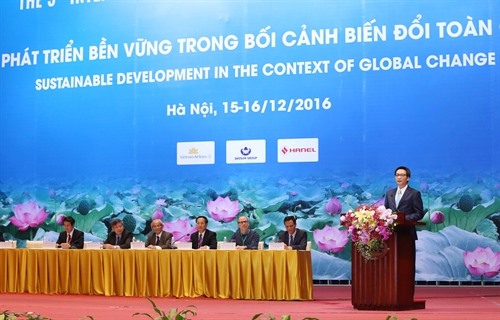 Society
Society

Deputy Prime Minister Vũ Đức Đam called on scientists to provide scientific findings and recommendations for national development during the fifth international symposium on Vietnamese studies held in Hà Nội yesterday.
 |
| Deputy Prime Minister Vũ Đức Đam yesterday hailed the nation’s impressive achievements, saying it was considered the second fastest growing economy in the world and a leading implementer of the UN Millennium Development Goals. — VNA/VNS Photo |
HÀ NỘI — Deputy Prime Minister Vũ Đức Đam yesterday hailed the nation’s impressive achievements, saying it was considered the second fastest growing economy in the world and a leading implementer of the UN Millennium Development Goals.
Việt Nam’s efforts to meet the UN’s Sustainable Development Goals have also been acclaimed, he said at the fifth symposium on Vietnamese Studies held in Hà Nội.
He said these achievements were made possible by the tireless efforts of Vietnamese people and support from the international community, including foreign scientists.
Đam called for more scientific findings and recommendations to serve the cause of national development.
He expressed his gratitude to scientists for providing the Party and State with objective foundations for issuing policies serving national development.
Concerted efforts
While peace and co-operation is still a key global trend today, latent risks remained, like sovereignty and religious conflicts, climate change and epidemics.
These require nations to join hands on the basis of respect for international law, national sovereignty and national interests, the Deputy PM said.
He said Việt Nam currently faces several challenges including the depletion of natural resources, environmental pollution, unequal access to basic services, and moral degradation.
Creativity, technological advances and cultural strengths have to be brought into play to achieve sustainable development, Đam said.
During the two-day event, participants will discuss six areas of global diplomacy: co-operation and integration; cultural resources; education and human resources; knowledge and technological transfer; economy and livelihoods; and climate change.
Recommendations made by the participants will be submitted to relevant ministries and agencies for reference as they make plans and formulate policies to spur national growth. — VNS




